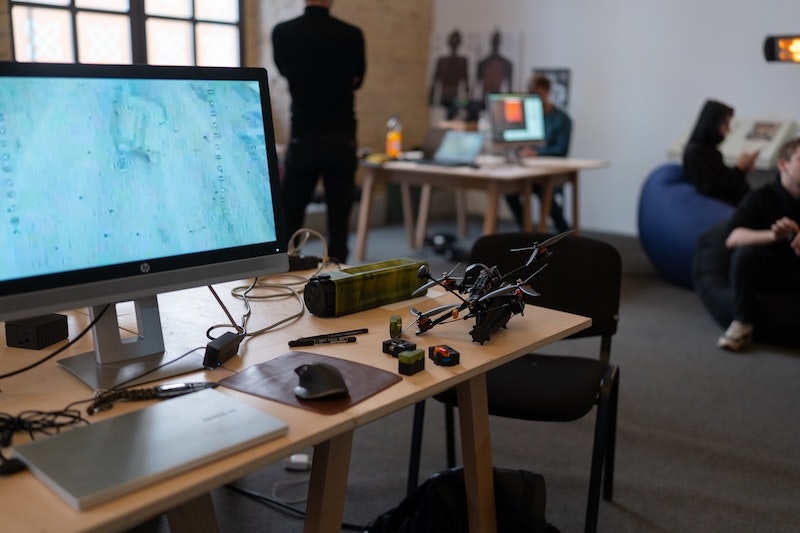Jeffrey Katz has more than a dozen contacts in Ukraine he can ping if he wants to live test the latest version of his company’s AI ‘brain’ for autonomous drones.
When he has something new for one of them, he can drop it into a box which is delivered to a military brigade within 48 hours, and a couple of days later it’s tested and evaluated. Katz, founder of Avtonomy, met those contacts in July last year during a five-day bootcamp run by Darkstar, a coalition of 40 founders, investors, developers and military experts.
Darkstar, which was set up in May last year by Ragnar Sass, founder of Estonian software unicorn Pipedrive, has swiftly become a no-brainer for serious defence tech founders. Its bootcamps have hosted around 60 startups from across Europe in Ukraine to teach them how to sell to the military, the country’s combat needs and to test technology live on the frontline. It’s also raising a €25m fund to exclusively back startups working on military applications, including weapons systems.
“If you’re a defence tech startup and you’re not in Ukraine I don’t know what you’re doing but you’re not doing it right,” says Katz.
‘Vibe-based procurement’
Darkstar’s bootcamps teach founders about fundraising, pitching, storytelling — the things you’d expect from any startup programme — but they’re also paired with mentors from the Ukrainian military.
“They’ll tell you, ‘these are our problems, these are not our problems, don’t come to us with an app that does XYZ, this is what we need right now’,” says Katz.
“The benefit for us was shortcutting a whole lot of networking, fact finding, connections building and understanding who we could go to to get information about how certain processes work, how we could get in touch with different units to do an evaluation of our technology.”
There have been four bootcamps so far. Companies that have attended are working on everything from radio equipment which allows drones to cover long distances using unorthodox radio frequencies to autonomous underwater drones. One company is working on shotgun cartridges which when shot extend a mesh net made of kevlar in front of unmanned aerial vehicles and trap the rotor blades. Avtonomy is building AI pilots for autonomous drone systems.
Increasingly, startups are joining the bootcamps from all over Europe. The latest bootcamp, which took place in July, included 11 startups from Ukraine, two from Estonia, two from Latvia, one from Germany, one from Finland, one from Iceland and one from the Netherlands.

The minimum requirement to participate is that a company has a working prototype, and preferably an active feedback cycle with end-users.
As part of the bootcamps there’s a day where all the teams go to a proving ground — an area where military trials happen with live ammunition — where companies show their products for mentors and military units. Sometimes, some units take a few companies they have special interest in to their own testing ground. A lot of direct procurement happens from this.
Every Ukrainian battalion has its own budget that it can use as it wants, Sass says. Each battalion commander can make a decision together with a procurement specialist, a soldier from the battalion who has finished special training in that area. It’s usually a two to three week process to finalise everything, Sass tells Sifted, adding that around 20-30% of the Ukrainian government’s procurement is decentralised through battalions.
All of Ukraine’s elite brigades also have their own separate fundraising team, which works with private donors and helps speed up procurement, in some cases within days, Sass says. All battalion & brigade level procurement is significantly faster than centralised procurement methods and helps to get the most updated product to the frontline, he adds.
There’s also a lot of “vibe-based procurement”, says Katz; when someone influential within the military gets hold of your tech, uses it effectively and posts on social media. “There’s this virality when you have something great that works,” he says. “When it works well you can start with the lower level, quick procurement, and when it really works well the pathway to getting noticed from above and getting bigger orders is pretty short.”
For some companies, the bootcamps have been a fast-track path to revenue. Sass tells Sifted he’s seen military units sign letters of intent with startups during the bootcamp, which for some companies has led to real revenue three or four weeks later.
From bootcamp to VC
Darkstar is quite a shift from Sass’s previous role, running Estonian CRM unicorn Pipedrive for over a decade before exiting it in 2020.
Before Russia invaded Ukraine, Sass had no involvement with the military — and until last year he promised himself he would never invest in any company building “lethal solutions”, he tells Sifted.
“The war was something that changed his mind forever,” says Tanya Chaikovska, the CEO of Lift99, which runs startup hubs in Kyiv and Tallinn and was cofounded by Sass in 2016.
Soon after Russia’s invasion Sass began moving the Lift99 team in Kyiv to Lviv, 540km west of the capital, near the Polish border, where they started to work full-time helping the Ukraine army. Then in the middle of March 2022 he led a convoy of 14 vehicles from Tallinn to Lviv delivering aid and equipment to be transported on to the frontline. Those convoys to date have delivered aid worth €14m, including 700 cars, and were the seedlings of Darkstar.
”I started to visit soldiers personally to understand the ground realities,” he says. “I started to understand the harsh realities, that this was not a usual war, it was a technological war.”
The ethical red-lines that have prevented investors from backing defence tech startups working on single use technologies — those for use on the battlefield — have slowly been eroding in Europe. Sass says he realised quickly after running the first bootcamp that there was an opportunity to evolve Darkstar.
“We ran the first bootcamp, we found amazing teams and started to look at the licence to run a fund which would have a mandate to invest in weapons systems,” he tells Sifted.
“The only place where we can do that effectively is Ukraine,” he says, “the biggest lab we see in the world for defence.”

The largest LP in Darkstar’s fund, which has closed €15m so far, is SmartCap, an Estonian investor which won’t back VCs unless they can back weapons. Other investors include European entrepreneurs and family offices.
Sass is surrounded by a Darkstar team which also includes Kaspar Gering, an exited founder who helped set up Wise’s machine learning practice and is its director of engineering of data platforms; Mart Noorma, a professor of space and defence tech at the University of Tartu in Estonia; and Philip Jungen, a Kauffmann Fellow and chairman of the supervisory board of the Red Cross Pension fund in Germany.
Lessons for Europe
The speed with which products are procured in Ukraine should be emulated across Europe, says Sass.
We need “unit level procurement” across Europe, he adds. “We need to build systems where every unit would have an innovation department which would have a budget to buy stuff, which gives them the opportunity to get new solutions, test them, understand what’s successful and what’s not and share that with central command.
“Those same units should also be involved in training for the future usage of those systems.”
The Ukraine war has also shown the importance of understanding the drone economy, robotics and autonomous systems; all areas which require strong engineering talent.
“It’s the first war where data analytics plays a huge role,” Sass says. One of the most successful brigades in Ukraine has 70 people working on data analytics, he adds. “The best military units are way more similar to the successful tech companies in Europe than to the military.
“Every army should reform and add a CTO into the top command. You need to rebuild organisational culture so you can be attached to innovations which are happening every three months.”
Artem Moroz, deputy head of partnerships and international cooperation at Brave1, which helps organise the testing of technology in Ukraine, says that it needs to become easier for early-stage companies to land contracts too. “The main lesson we need to learn from this procurement cycle is that, unfortunately, when you look at contracts from MoDs they award primes, and it means that it stops the startup ecosystem as they can’t compete with these huge contracts.”
Some countries are reforming, especially in the Baltic region. Estonia, for example, recently announced a new development plan which will allocate more than €10bn over the next four years to strengthen the country’s national defence capabilities. Of that €150m has been put aside to acquire “modern capabilities, including drones”.
“The closer you are to the Russian border the quicker things move from a procurement perspective,” Katz says. “I don’t think an initiative like Darkstar would be coming from Paris or London, or places where they don’t have the direct sense of urgency.”
The UK is also seen as an attractive place for defence tech, and has managed to attract some of the buzziest defence companies to its shores. The Strategic Defence Review unveiled by the government in June this year committed to streamlining procurement processes and cut down timelines to three months for novel technologies and about a year for modular upgrades.
That said, “Europe still has a long way to go,” says Chaikovska. “I don’t think that a person can change the perspective of defence tech in countries like Germany or France without some greater course from inside.”
Read the orginal article: https://sifted.eu/articles/darkstar-defence-tech-ukraine-profile/


